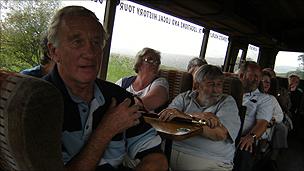The Very Last of the Summer Wine
- Published
Greengrocer Andrew Bray gives a tour around Holmfirth, where Last of the Summer wine was filmed
The world's longest-running sitcom, Last of the Summer Wine, comes to an end this weekend. In the Yorkshire town where the series is set, fans are preparing to bid farewell to a TV institution.
On a soggy afternoon in Holmfirth, the Last of the Summer Wine tour bus is almost full. Sightseers peer through the rain-streaked windows at the cobbled streets and lush green fields that are part of sitcom history.
In this picturesque setting, three old friends ambled up hill and down dale - pondering life, plotting harebrained schemes and refusing to bow to the passing years.
For the coach load of tourists following in their footsteps, the journey is bittersweet. After 295 episodes, the summer wine has finally run dry.
"It's sad to see it go," says one woman who has travelled from Dorset. "It was funny without being crude."
Her husband nods in agreement: "There was no bad language, so the whole family could watch. It's the end of an era."
The era began in 1973, when the show was originally commissioned as a one-off for the BBC's Comedy Playhouse. It was a radical proposition - a sitcom about a gang of pensioners with nothing much to do and all day to do it in.
It seemed an unlikely source of humour, but the antics of Compo, Foggy and Clegg were soon a hit with viewers.
Tourist trail
Audiences also fell in love with another character - Holmfirth itself. For many watching on a Sunday night, its gentle leafy lanes and unspoilt countryside seemed a comforting throwback to a bygone age.

The town attracts sightseers throughout the year
The show came at a good time for the Pennine town. The traditional textile industry was in decline and tourism helped revive the local economy.
Today, visitors can have a cuppa in Sid's Cafe, see props in a special museum and even stay the night at Nora Batty's house.
Some townsfolk resented the disruption caused by tourists and filming, but others welcomed the opportunities the show created.
Ron Backhouse runs the local pub, The White Horse. He got on so well with the production team they gave him a part as the on-screen landlord.
Despite no previous acting experience, he was in the show for 18 years. He recalls it was daunting to begin with.
"I remember the first words I had to say - the tremors were there, and to get this out was unbelievable," says Ron. "Then I thought afterwards, 'they're all my mates now, so why be nervous?' And after that I took to it like a duck to water."
Critics
At its peak in the 1980s, the programme was attracting 19 million viewers. The current series has pulled in around 4 million - still a sizeable audience in the multi-channel era, but many felt the jokes had become tired.
There was a growing reliance on predictable slapstick gags involving things on wheels going downhill - beds, sofas, roller-skates. The show was parodied by Vic Reeves and Bob Mortimer as Three Men in a Bath, in which the three main characters were shown rolling down a hill in a bathtub.
Radio Times readers once voted it the programme they most wanted cancelled.
Even in the town it made famous, many are unconcerned by the decision to scrap the show. A surprising number thought it had stopped years ago.
Some residents are keen to see the area move on and show it has more to offer than cloth-capped Yorkshire stereotypes.
'Never die'
Back on the Last of the Summer Wine tour bus, there is no desire to let go of the past.
Tour guide Colin Frost says visitor numbers this summer are up, and - despite the fact the cameras have stopped rolling - he predicts TV repeats and DVDs will win over new generations.
"Ask yourself - how long have the Brontes been dead? And how busy is Haworth?" he grins. "There's still interest from all over the world. It'll never die."
One character will be part of the landscape forever. The actor Bill Owen - who played scruffy Compo till his death in 1999 - is buried in the local church yard.
Long-running plans for a life-size bronze statue in the town centre remain on hold so, for now, this is where well-wishers come to leave cards and flowers.
A pair of Compo's famous green wellies stand by his graveside, overlooking the alleys and streams and fields where he and his pals entertained millions.
Time has been called on the very Last of the Summer Wine, but for fans it was a fine vintage.
- Published23 August 2010
- Published14 July 2010
- Published2 June 2010